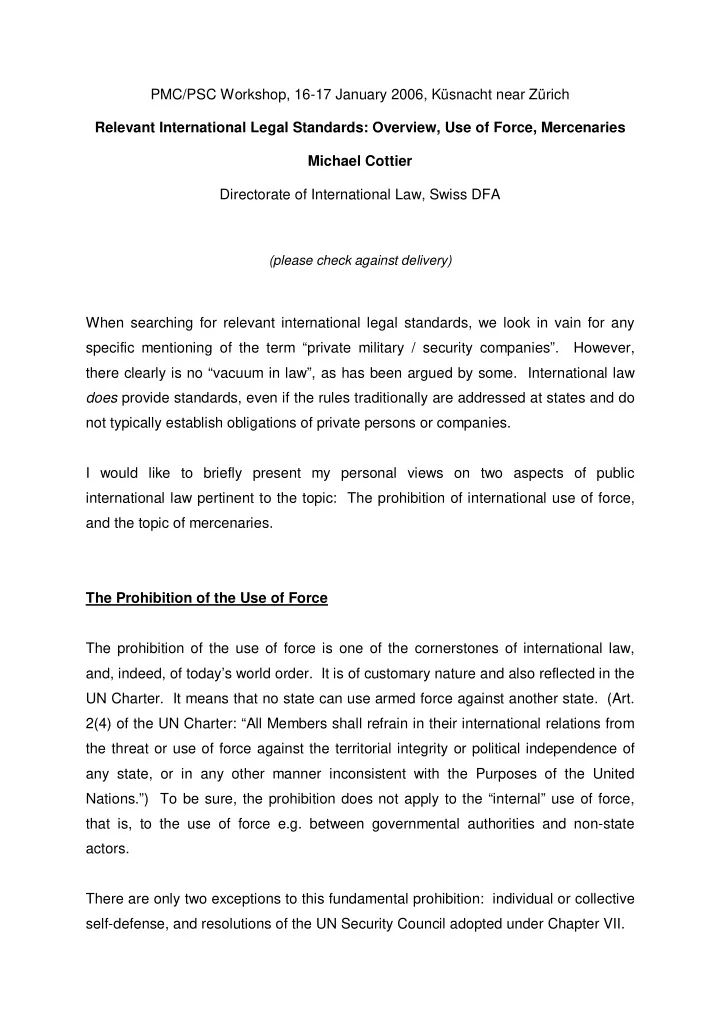

PMC/PSC Workshop, 16-17 January 2006, Küsnacht near Zürich Relevant International Legal Standards: Overview, Use of Force, Mercenaries Michael Cottier Directorate of International Law, Swiss DFA (please check against delivery) When searching for relevant international legal standards, we look in vain for any specific mentioning of the term “private military / security companies”. However, there clearly is no “vacuum in law”, as has been argued by some. International law does provide standards, even if the rules traditionally are addressed at states and do not typically establish obligations of private persons or companies. I would like to briefly present my personal views on two aspects of public international law pertinent to the topic: The prohibition of international use of force, and the topic of mercenaries. The Prohibition of the Use of Force The prohibition of the use of force is one of the cornerstones of international law, and, indeed, of today’s world order. It is of customary nature and also reflected in the UN Charter. It means that no state can use armed force against another state. (Art. 2(4) of the UN Charter: “All Members shall refrain in their international relations from the threat or use of force against the territorial integrity or political independence of any state, or in any other manner inconsistent with the Purposes of the United Nations.”) To be sure, the prohibition does not apply to the “internal” use of force, that is, to the use of force e.g. between governmental authorities and non-state actors. There are only two exceptions to this fundamental prohibition: individual or collective self-defense, and resolutions of the UN Security Council adopted under Chapter VII.
Of course, states can under no circumstances circumvent this prohibition by delegating the use of force to private companies. Insofar the use of armed force by private actors against State B can be attributed to a government A, it is no different than if government A had attacked state B with its armed forces. Such use of force would constitute a most serious breach of international law and could even give rise to individual criminal responsibility. Similarly, private military / security companies must not be used to interfere in matters within the domestic jurisdiction of any State. International Law concerning Mercenaries The use of mercenaries is not as such prohibited under customary general international law or under any broadly ratified international treaty. International humanitarian law does not prohibit mercenaries. All that Art. 47 of the First Additional Protocol of 1977 does is to provide that “a mercenary shall not have the right to be a combatant or a prisoner of war”, that means, that he is not entitled to the privileged treatment of a prisoner of war. In contrast, both the UN International Convention against the Recruitment, Use, Financing and Training of Mercenaries of 1989 (28 ratifications) and the Convention of the African Union for the Elimination of Mercenarism in Africa (26 ratifications) clearly prohibit the use of mercenaries and related activities. They establish related obligations of states to, inter alia, prohibit and criminalize on its territory “mercenary” activities such as recruitment, training or financing of mercenaries, prevent nationals or foreigners from engaging in such acts and prevent passage of mercenaries and related equipment through its territory. The definition of “mercenaries” of these instruments is essentially the same as in Art. 47 of the First Additional Protocol. However, the cumulative conditions of this provision are so restrictive, that it is difficult to prove anyone to be a mercenary. Only a very small part of the armed services that private military / security companies
would actually consist in taking a direct part in hostilities. Most staff of private military / security companies would not fit the definition of “mercenaries”. Also, the approach of the mercenary conventions is to either totally outlaw certain activities or not at all regulate them. Therefore, this approach does not seem to address key issues with regard to the use of private military / security companies. To be sure, states of course remain free (subject to other international obligations) to outlaw certain activities of PMCs/PSCs. In Spring 2005, the successor to the UN Special Rapporteur on Mercenaries, the UN WG on Mercenaries has received a more extensive mandate by the UN Human Rights Commission, opposed by a considerable number of states. Their study of the activities of private companies is still qualified by a particular emphasis on “the right of peoples to self-determination”. It will thus have to be seen how the working group will go about the mandate and to what extent it will touch upon issues our Workshop and process are interested in. Following these brief remarks on the prohibition of the (inter-state) use of force and international law concerning mercenaries, Emanuela-Chiara Gillard will address the area of international humanitarian law while Cordula Droege will comment on human rights law. With regard to the issue of state responsibility, I wish to refer to a report on the basis of an expert workshop organized by the CUDIH in August 2005. Thank you.
Recommend
More recommend